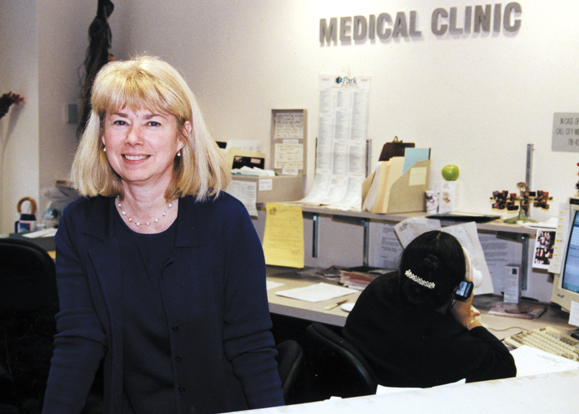The next time there’s a tragic fire in New York City, it’s a good bet Kerry Kelly will be on the scene. Her Dad is a retired FDNY Lieutenant. Her grandfather was a firefighter. One of her three brothers also works for the department.
But Kelly is not one of the growing numbers of women joining the firefighters’ ranks. Though a trailblazer, her path to the FDNY included stops at ultra-prestigious Vassar College and Brown University.
Dr. Kelly is the Fire Department’s Chief Medical Officer. And on the morning of September 11, she went straight to the perilous scene, even before the Twin Towers had collapsed.
“I was at a hospital making rounds and the first beep came over…that a plane had hit the Twin Towers,” she recalls. “I got in a car and headed over. I was unaware it was both towers when I got there. It looked horrific. People had jumped out of the buildings…there were lots of body parts.”
Dr. Kelly was beginning the grim task of examining a firefighter whose skull was cracked by falling debris when the first tower fell.
“I thought, `This is it, I’m dying.’…It was pitch black, you could not see a thing. I thought we were buried by debris.”
But amidst the horror, after having been shoved against a wall for safety by a firefighter, Dr. Kelly went right to work. She helped load injured victims onto rescue boats, and set up a triage center on Broadway, near City Hall.
Soon after the second tower fell, however, Dr. Kelly and the FDNY had to face a horrible fact.
“There were very few patients. Unfortunately, everyone was dead.”
In the months following September 11, Dr. Kelly and her staff have been working non-stop to tend to the department’s profound physical and psychological needs.
“We just finished 10,000 medical [tests] on fire officers, EMS, [and other rescue workers]. We’ve been very busy,” says Dr. Kelly, who was born in Our Lady of Good Council Parish on Staten Island’s North Shore. She lives right next door to the house where she spent her childhood, in a predominately Irish and Italian neighborhood.
Dr. Kelly’s office, based in the downtown Brooklyn Metrotech building, has also had to meet tremendous psychological needs.
“We always had a [counseling] unit. But obviously it had to expand.”
Dr. Kelly was able to turn to fellow Irish-American Malachy Corrigan, who is director of the FDNY Counseling Services Unit.
Since September 11, FDNY counseling satellite offices have opened in Queens, Staten Island and Suffolk County, with others on the way.
“The needs are so great,” notes Dr. Kelly, who has been an FDNY medical officer for two decades, and also practices family medicine on Staten Island.
Though her work entails helping others, Dr. Kelly admits that she has struggled in the months since the terrorist attacks.
“There’s no way it wouldn’t affect me. I’m happy to be here, we all lost so many people we were close to,” says Dr. Kelly.
A particularly painful loss was FDNY Captain Timmy Stackpole. Dr. Kelly grew close to Stackpole, his wife and five kids following a 1998 blaze in Brooklyn, which claimed the life of Lt. James Blackmore immediately, and Lt. Scott La Piedra an excruciating 29 days later. Three other firefighters were hospitalized — including Capt. Stackpole.
But with fierce determination, as well as Dr. Kelly’s able assistance, Stackpole not only recovered, but went back on the job last year. Stackpole was one of the 343 firefighters killed on September 11.
“This is the type of job where you get to know people,” Dr. Kelly says. “The things that make this such a strong department, when something like this comes along, makes it tougher.”
Still, the tight-knit nature of the FDNY — and the outpouring of support from New York City and across the country — have helped Dr. Kelly keep her focus on recovery. “This has brought out the best in people,” she says. ♦


Leave a Reply